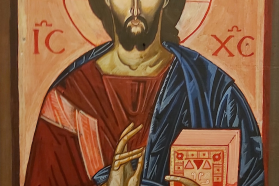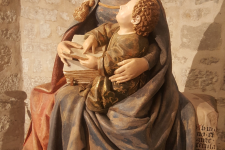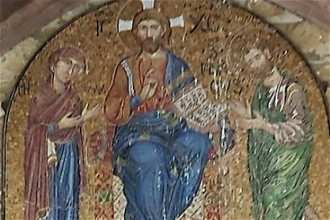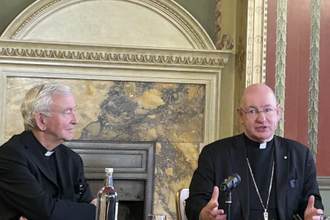Sunday Reflection with Fr Robin Gibbons - 24 May 2020
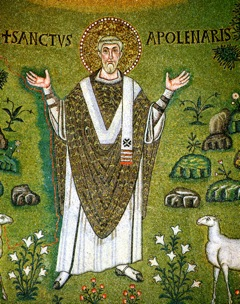
St Apollenaris Ravenna
Seventh Sunday after Easter
We all know that prayer is not simply a matter of words, it is about our inner disposition, willingness to enter into the risky business of connecting with the Holy One, but it's also about our external demeanour, our physical attitude. Many well-versed adepts of prayer have written and talked about the various ways in which we still our bodies, close eyes, enter into stillness. It was frequently assumed, as we find in the Rule of Benedict in his Chapter 7 on Humility that monks should bow down in humility:
'his head must be bowed and his eyes cast down Judging himself always guilty on account of his sins, he should consider that he is already at the fearful judgment, and constantly say in his heart what the publican in the Gospel said with downcast eyes: Lord, I am a sinner, not worthy to look up to heaven (Luke 18:13). And with the Prophet: I am bowed down and humbled in every way (Ps 37[38]:7-9; Ps 118[ 119]:07).'(RSB Ch 7)
I have to be fair and also say the Benedict did not regulate much else for personal prayer except it be short and pure, unless prolonged by divine assistance (RSB Ch 20). I have always admired this insightful comment, but I am also not one who finds the posture of submission in prayer to be a helpful one. The Scriptures as always show us a way of understanding, if we but take time to read and digest what is there. The reference to the Publicans down cast posture may be a valid critique of humility in prayer, but it is also the prayer of somebody who does not feel able to lift up their face and hands in another common posture, one where we look heavenwards, upwards in freedom. This is what Jesus does as he starts his very intimate dialogue with the Father in John 17. His posture is of facing, being open to God, of uprightness, a different and to my mind more helpful posture of faith and prayer in certain situations.
Why is this idea of posture in prayer part of my theme for this Sunday's reflection? Three things, one is about our present attitude as Christians, perhaps because at this particular moment in time, when there seems to be confusion about the Virus and its continuing effects, the religious person is called to listen, look and understand with eyes and ears open to the words, not only of God, but of the scientist and medical researcher. We cannot turn inwards, flee back to some spiritual castle and lock the doors against the challenges we are now being called to face. There is no enemy except our own response; even this virus is not an enemy but more a consequence of our own actions in the past. We are truly responsible for what we have done. Maybe we should adopt the posture of humility, but too often that becomes a closed spiritual world where we cut out things so we need to face the consequences with God. That brings me to the second point.
In the Psalm for today (Ps 27) this becomes part of our prayer;
'One thing I ask of the LORD;
this I seek:
To dwell in the house of the LORD
all the days of my life,
That I may gaze on the loveliness of the LORD
and contemplate his temple'.(Ps 27:4)
The invitation and desire of the psalmist are for an engaged encounter, a relationship in which we desperately want to know God, to dwell in God's house, that is the Kingdom in its fullness, and there meet God face to face, this Lord who is light and salvation (Ps 27:1) . That suggests something beyond that early step of humility, where we acknowledge our unpreparedness, our capacity to miss the mark, to sin. No, this is a psalm of hope that things can and will get better. The first letter of Peter echoes the call to stand up and look God in the face, to lift up our hearts; to paraphrase this reading, yes we share in Christ's sufferings, but we also share in his glory, and if we suffer it should be on account of our willingness to rejoice in our relationship with Christ, we who call on him and bear his name.(I Peter 4 13-16). This is part of our vocation as an Easter People anointed by the Spirit! So let us try a different method of prayer from time to time, reaching towards God, outwards, not inwards!
My third point is something we need to be fully aware of and also deal with as Christians in the world. Jesus in this prayer tells us that eternal life is not what we imagine; it is about knowledge of God, of Christ, of the Spirit's intimate connection with us, a deep belonging to the Divine Presence! This means we act in God's manner! At a time when many countries are seeking to reopen places to ease lockdown measures, a vociferous minority of religious people in certain countries, demand that their right to freedom of worship be given priority as essential, but this cannot be absolute, prudence demands we listen carefully and keep people as safe as possible until we are told that the virus is under control! That is what bearing one another's burdens means.
I'm not alone in being wary of this call to make religion a case for special pleading. In our case Article 9:1 of the European Convention on Human Rights states that we should be free to have the right to freedom of thought, conscience and religion, but it is not an absolute right, for the second part (Art 9:2) states: 'this shall be subject only to such limitations as are prescribed by law and are necessary in a democratic society in the interests of public safety, for the protection of public order, health or morals, or for the protection of the rights and freedoms of others'.
The great commandment makes us place our own needs at the greater service of others and of God. Jesus in this gospel prays about those of us who are 'in the world' that we may glorify God in our lives and accomplish the mission we have been called to do. This means concern for the health, safety and well being of others and as encapsulated in that posture of prayer facing and looking upwards and outwards, we not only lift up our hearts, but then do what is right and just. We listen to the wisdom God has given to those who research and help us at this moment in time to deal with a pandemic. That is our call as the Easter people, as we journey towards Pentecost it is a call to pray for the Spirit's gift of prudence in what we do!
Lectio divina
Desert Fathers on Unceasing Prayer
Abba Lot went to Abba Joseph and said, 'Abba, as far as I can, I keep a moderate rule, with a little fasting, and prayer, and meditation, and quiet: and as far as I can I try to cleanse my heart of evil thoughts. What else should I do?' Then the hermit stood up and spread out his hands to heaven, and his fingers shone like ten flames of fire, and he said, 'If you will, you can become all flame.'
Extract from: MESSAGE OF St JOHN PAUL II
ON THE VALUE AND CONTENT OF FREEDOM
OF CONSCIENCE AND OF RELIGION
Friday, 14 November 1980
" In addition, the wholesome implementation of the principle of religious freedom will contribute to the formation of citizens who, in full recognition of the moral order, "will be obedient to lawful authority and be lovers of true freedom; people, in other words, who will come to decisions on their own judgment, and, in the light of truth, govern their activities with a sense of responsibility, and strive after what is true and right, willing always to join with others in cooperative effort" (Dignitatis humanae, no. 8).
Moreover, if it is properly understood, religious freedom will help to ensure the order and common welfare of each nation, of each society, for, when individuals know that their fundamental rights are protected, they are better prepared to work for the common welfare.
Respect for this principle of religious freedom will also contribute to strengthening international peace which, on the contrary, is threatened by any violation of human rights, as pointed out in the aforementioned UN address, and especially by unjust distribution of material goods and violation of the objective rights of the spirit, of human conscience and creativity, including man's relation to God. Only the effective protection of the fullness of rights for every individual without discrimination can guarantee peace down to its very foundations'.
Fr Robin is an Eastern Rite Catholic Chaplain for Melkites in the UK. He is also an Ecumenical Canon of Christ Church Cathedral, Oxford. You can follow him on Twitter: @RobinGibbons2



